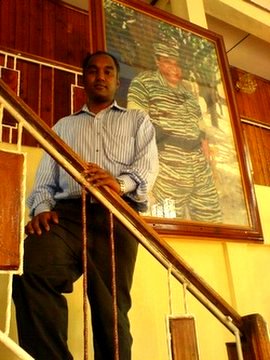However even now old biases remain.
The pardi community is looked at with suspicion by the police and the public at large.
" When ever there is a robbery, a murder or any crime we are the first suspects. The police come to our village and harass us. They round up our boys and beat them up. Every week some boy or the other from the village is picked up" says Sunita Pawar a Pardi woman at a Pardi Village near Osmanabad.
There is no primary health center in the village. The closest hospital is 10 kilometers away.
"When ever someone is seriously ill, we have to carry them on foot to the hospital." says another villager.
The hospital has no ambulance and the road to the village is just a dirt track with pot holes and stones.
Government apathy is clear. Most of the villagers have not even been issued voter
I cards.
Most people are poor enough to be classified as "living under the poverty line" but only a few have government issued cards that make them eligible for subsidised rations.
The village has a primary school that operates from two rooms. Children who want to study further have to trek 5 kilometers away to another village.
Many don't even get past primary school. Government teachers appointed to teach here refuse to come to the village. The village is considered "risky".
Young boys in the village say they are forced to take up crime.
" I have studied till class 9. No one wants to give a Pardi a job. We are looked at as criminals. Who would want to hire us?" says Sunil a young resident.
The village is technically electrified, but only handful of households have electricity. A majority can't afford to pay the minimum bill.
As for drinking water, women have to walk to a well some distance from the village. The balance themselves precariously as they pull out bucketfuls of water.
There are reservations in educational institutions and government jobs for the tribe. But very few from the community are able to get the benefit of the affirmative action.
" If I don't have the money to buy books for my child, buy his uniform or even let him to to school what is the use of reservation. If the child is not educated what is the use of quotas in the government job." the village headman asks.
.jpg)
.jpg)
.jpg)
.jpg)
.jpg)
.jpg)
.jpg)
.jpg)
.jpg)
.jpg)
.jpg)


2 comments:
And we take so many things for granted!!!
What people say may be horrible but some of it is true... You won't believe me but they do kill and break the grills pf people's houses in Mumbai. I know friends who claim that they hang upside down on trees and suck the blood out of people going near them.
Post a Comment